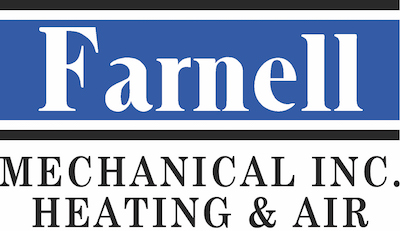
If you’re unsure whether your Auburn and Opelika home has poor indoor air quality (IAQ), it likely does.
We are indoors a lot. In reality, we’re in a building up to 90% of the time, according to the U.S. Environmental Protection Agency. And the air inside residences could be 2–5 times worse than outdoors, which can create long-term health issues.
Most Common Sources of Unsatisfactory IAQ
We’ve made a list of the most common origins of poor IAQ, the troubles they create and how you can remedy these indoor air pollutants. If you’re troubled by the air inside your residence, we advise talking with a pro like Farnell Mechanical, Inc. about which products are a good fit for your family.
Volatile Organic Compounds
Volatile organic compounds, or VOCs, are chemicals emitted from everyday household things.
They’re found in paint and stains in addition to:
- Furniture
- Carpet
- Building materials
- Cleaning products
- Cosmetics
- Air fresheners
- Candles
When these chemicals accumulate in your home, they might irritate your eyes, nose and throat. They might also create headaches and nausea. Regardless of whether your home is in a rural or industrial area, an EPA study found indoor levels of these fumes can be 2–5 times greater than the air outside.
Always follow the manufacturer’s instructions when using paint or cleaning supplies. Opening a window can help chemicals dissipate faster.
Air purification systems can also improve your air. This equipment partners with your heating and cooling system to freshen indoor air. When seeking a model, ensure it’s specifically designed to eliminate VOCs.
Dust and Pet Dander
Dust and pet dander can trigger health problems like asthma and allergies, especially when it constantly gets moved by your residence’s comfort equipment. While you can vacuum more frequently and install an improved air filter, an air filtration system might be a better solution.
This solution hooks to your HVAC equipment to provide strong filtration. Some models have hospital-level filtration for eliminating particles and bioaerosols.
Lasting Odors
Newer houses are closely sealed to boost energy efficiency. While this is great for your utility expenses, it’s not very good for your IAQ.
Stale odors can hang around for a greater amount of time because your home is pulling in less fresh air. As keeping your windows open all year-round isn’t an option, here are two methods you can make your indoor air smell better.
An air purification system is installed in your ducts to eliminate odors before they recirculate. Search for one with a carbon filter and the ability to eliminate dangerous VOCs. This equipment can also help keep your loved ones healthy by wiping out most bacteria and normal allergy triggers like pollen and mold spores.
A ventilation system removes stuffy indoor air and replaces it with fresh outdoor air. There are two types of systems (heat recovery and energy recovery), so ask our professionals for more details on which kind is best for your home.
Uneven Humidity
It’s important your home’s humidity keeps even. Air that has too much moisture can lead to mold, while dry air can lead to respiratory concerns.
Our experts suggest 40–50% for ideal comfort. To keep yours steady, think about getting a whole-home humidifier or whole-home dehumidifier with your comfort equipment.
Instead of having to drag a humidifier from room to room, this solution delivers even humidity across your house.
Carbon Monoxide
Carbon monoxide is colorless gas you can’t smell. It occurs when there’s insufficient combustion in fuel-burning appliances, like gas heating systems, water heaters or fireplaces.
It poses a severe health risk. In low levels, it can lead to flu-like symptoms like headaches and nausea. It could be fatal in big amounts.
We suggest annual furnace maintenance to make sure your system is running like it should. This service allows our pros to spot troubles before they begin, including malfunctions that can lead to carbon monoxide leaks.
The best method to keep your home free of carbon monoxide is to put in detectors. These alarms should be on every floor near bedrooms and living areas.
Better Your Home’s Air Quality with the Farnell Mechanical, Inc. Professionals
Informed that your residence has inferior air quality but not sure how to enhance it? Or unsure which option is best for you? Give our approachable HVAC specialists a call at 334-524-2458 or contact us online today. With free estimates and pro assistance, we’ll help you choose the best option for your family and budget.
